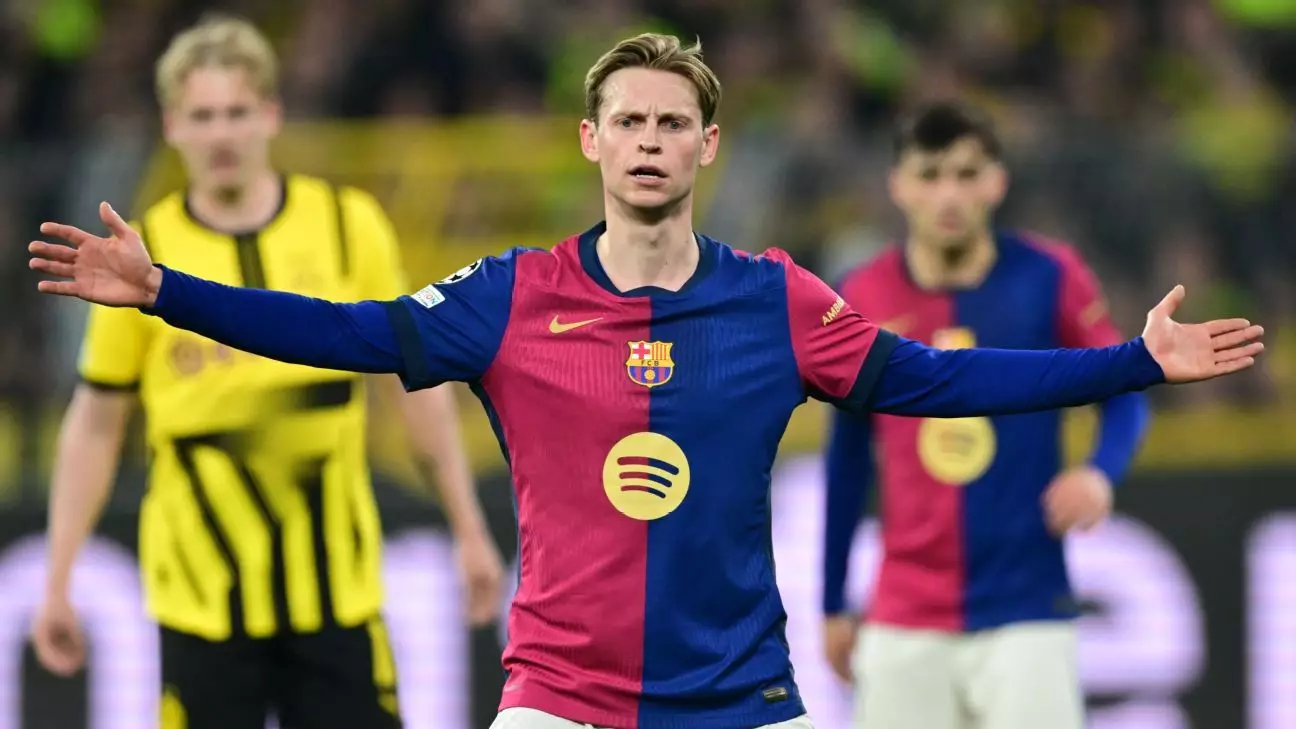Barcelona’s recent foray into the UEFA Champions League brought them face to face with the gritty intensity of Borussia Dortmund in a tie marked by both jubilation and trepidation. While the Catalan giants secured their place in the semifinals—a feat they hadn’t achieved since 2019—their journey was marred by a disconcerting 3-1 defeat on foreign soil. The electrifying performance of Dortmund’s Serhou Guirassy, who scored a hat trick, only served to amplify the complexities at play. Barcelona may have advanced with a 5-3 aggregate victory, but lurking beneath the surface were echoes of past European heartbreaks, reminiscent of their infamous collapses against AS Roma and Liverpool.
As Barcelona celebrated the milestone with their loyal away supporters, the atmosphere was laden with subdued relief rather than uninhibited joy. This reluctance to engage in unabashed festivity stemmed from a fear that their weaknesses might resurface when facing stiffer challenges in the later rounds of the tournament. Coach Hansi Flick articulated this sentiment, indicating that the team was not quite in the celebration mood. “Lads, we’re into the semifinal,” he had to remind them, underscoring a certain expectation Barcelona places upon itself—a relentless pursuit of excellence that leaves little room for complacency.
A Study in Contradictions
The conundrum that Barcelona presented in this matchup against Dortmund raises critical questions about their trajectory this season. Having previously been mired in the shadows with back-to-back years in the UEFA Europa League, their resurgence in the Champions League has highlighted both their potential and their vulnerabilities. Celebrations that were initially sparked by a 4-0 first-leg victory quickly fizzled in the face of a shaky performance in Germany, spurring doubts about the team’s readiness to engage in high-stakes matches against formidable opponents.
The night featured several alarming moments for Barcelona, including defensive lapses that hinted at deeper issues within the squad. The absence of key players like Alejandro Balde, alongside a rested Pedri, introduced an unfamiliarity into the team’s performance. It was evident that Barcelona was far from their best. Time and again, players struggled under the pressure, with Wojciech Szczęsny’s hesitancy resulting in a penalty and Jules Koundé’s misalignment with the high defensive line creating openings for Guirassy. Their defensive issues could, indeed, become even more pronounced when facing clubs with lethal attacking prowess in the later stages of the tournament.
The Weight of Expectations
As the dust settled, the players‘ reactions were uncomfortably telling. Raphinha, visibly fatigued, took time to collect himself before joining his teammates for a muted appreciation of their traveling supporters—a stark contrast to the vibrant displays of affection one would typically expect after a hard-fought victory. Koundé echoed the palpable disappointment, acknowledging that they lacked the vigor and cohesion demonstrated in the first leg. The tension was not just on the pitch but in the mindset of a squad grappling with how to transform expectations into achievements.
Perhaps the most striking takeaway from this clash lies in the growing scrutiny of Barcelona’s evolution this season. Having emerged from a trophy-less year and surprised many by not only reaching the semifinal but also leading LaLiga and seeking Copa del Rey glory, the benchmark has changed dramatically for the team. Yet, maintaining that upward trajectory is fraught with obstacles.
The Road Ahead: Embracing the Challenge
Barcelona’s journey does not end here; looming ahead are fierce challenges. The team’s management and players must consider that having a young and ambitious squad means it will inevitably face challenges where learning and growth are non-negotiable. Flick’s focus, although partly reflective, remains on harnessing the positives during this upswing. “What the team has done is phenomenal,” he affirmed, pointing to the depth of talent contributing collectively to their success thus far.
However, this triumph also serves as a reminder that complacency can be detrimental. The result in Dortmund should channel their energies toward performance improvements; otherwise, they risk descending into a cycle of missed opportunities. The anticipated clash with neighbored rivals Real Madrid in the Copa del Rey final, paired with the high stakes of potentially facing Bayern Munich or Inter Milan in the Champions League, creates a crucible that will test the mettle of the entire squad.
Barcelona stands at the intersection of past scars and present aspirations. Their unwavering commitment to reclaiming their status among the elite is praiseworthy, but navigating through the treacherous waters ahead will require more than just flair—it demands resilience, strategy, and perhaps most importantly, a collective willingness to evolve. The echoes of past failures can either serve as burdens or as catalysts for future glory. As the team moves forward, every match will be a testament to whether they’ve truly learned from their history or will once again be tangled in it.


Napsat komentář